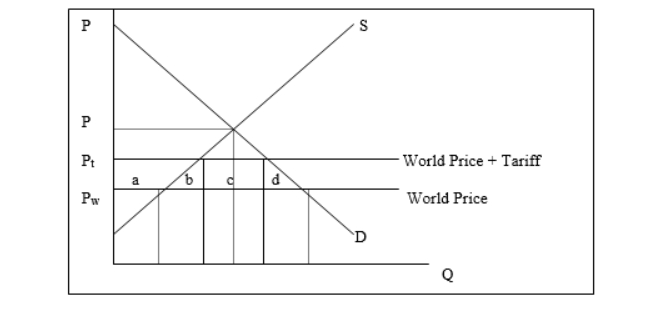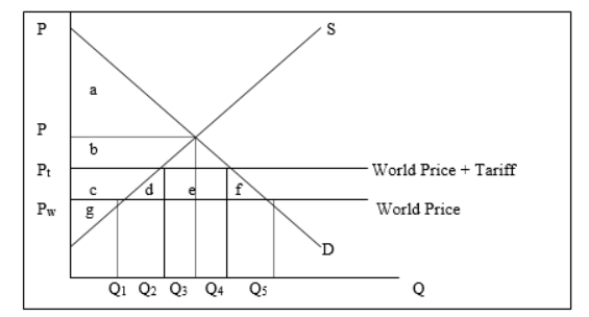Deck 7: Tariffs
Question
Question
Question
Question
Question
Question
Question
Question
Question
Question
Question
Question

Unlock Deck
Sign up to unlock the cards in this deck!
Unlock Deck
Unlock Deck
1/12
Play
Full screen (f)
Deck 7: Tariffs
1
Use the graph below to answer the following questions:

-Without a tariff the price of imports would be:
A) a + b + c + d.
B) b + d.
C) P.
D) Pw.

-Without a tariff the price of imports would be:
A) a + b + c + d.
B) b + d.
C) P.
D) Pw.
Pw.
2
The following figure illustrates the demand and supply curves for PCs in a small country. Use this figure to answer the following questions:

-With free trade the country imports:
A) Q1.
B) Q2.
C) Q3.
D) Q1 to Q5.

-With free trade the country imports:
A) Q1.
B) Q2.
C) Q3.
D) Q1 to Q5.
Q1 to Q5.
3
The following figure illustrates the demand and supply curves for PCs in a small country. Use this figure to answer the following questions:

-With a tariff imposed on PCs, the country imports:
A) Q1.
B) Q2.
C) Q3.
D) Q2 to Q4.

-With a tariff imposed on PCs, the country imports:
A) Q1.
B) Q2.
C) Q3.
D) Q2 to Q4.
Q2 to Q4.
4
Which of the following is not a common argument for tariffs?
A) Increase the number of jobs in the economy.
B) National defense.
C) Infant industry.
D) Senile industry.
A) Increase the number of jobs in the economy.
B) National defense.
C) Infant industry.
D) Senile industry.

Unlock Deck
Unlock for access to all 12 flashcards in this deck.
Unlock Deck
k this deck
5
Describe the different methods of valuing imports.

Unlock Deck
Unlock for access to all 12 flashcards in this deck.
Unlock Deck
k this deck
6
Describe the concepts of consumer and producer surplus.

Unlock Deck
Unlock for access to all 12 flashcards in this deck.
Unlock Deck
k this deck
7
A tariff tends to decrease consumer surplus and increase producer surplus. Show why this is true.

Unlock Deck
Unlock for access to all 12 flashcards in this deck.
Unlock Deck
k this deck
8
Show how the government benefits from the imposition of a tariff.

Unlock Deck
Unlock for access to all 12 flashcards in this deck.
Unlock Deck
k this deck
9
Suppose that a bottle of beer sells for $1 and contains $.20 of imported inputs. If the tariff on beer is 20 percent and the tariff on imported inputs is 5 percent, what is the effective rate of protection?

Unlock Deck
Unlock for access to all 12 flashcards in this deck.
Unlock Deck
k this deck
10
Explain the various arguments for tariffs.

Unlock Deck
Unlock for access to all 12 flashcards in this deck.
Unlock Deck
k this deck
11
Why is a production subsidy less costly than a tariff in expanding output in a particular industry?

Unlock Deck
Unlock for access to all 12 flashcards in this deck.
Unlock Deck
k this deck
12
Explain why tariffs do not increase the overall level of employment in an economy.

Unlock Deck
Unlock for access to all 12 flashcards in this deck.
Unlock Deck
k this deck



